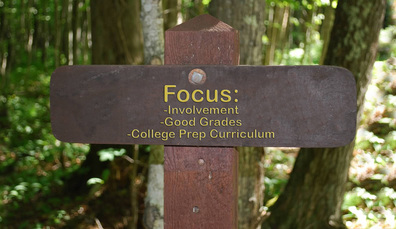9TH GRADE: PLAN
August |
OBJECTIVE 1:
Start your high school career out with a firm commitment to academic success. Every grade that you earn from this point on will determine your college eligibility and scholarship competitiveness. GPA and class rank do matter! ACTION 1: Contract for Success |
September |
OBJECTIVE 1:
Begin to build your high school resume by participating in extra-curricular activities: join a sports team, after-school club, academic competition, band, etc. ACTION 1: Join an extra-curricular activity that you find interesting. OBJECTIVE 2: Find out if your school offers the ACT Aspire Test (a pre-test for the ACT for levels 3-10). ACTION 2: ACT Aspire Test |
October |
OBJECTIVE 1:
Take the PSAT this month if it is offered at your school. This is the test that qualifies you for the National Merit Scholarship program (which could earn you money for college) and it is practice for the SAT. ACTION 1: PSAT |
November |
OBJECTIVE 1:
Continue developing your writing skills. Enter a local, regional, or national writing contest. This will provide valuable experience with writing and revising essays and could lead to scholarship or award money. ACTION 1: Society of Professional Journalists Essay Contest DAR Essay Contest Library of Congress Essay Contest |
December |
OBJECTIVE 1:
Consider volunteering or participating in a community service project. All of the hours you dedicate to this type of service can be included on your college and scholarship applications and resumes. ACTION 1: "Volunteering: How Helping Others Helps You" |
January |
OBJECTIVE 1:
Keep track of all awards and accomplishments that will eventually be included on your application. Be sure to include academic, extra-curricular, and awards and experiences. ACTION 1: College Prep Resume |
February |
OBJECTIVE 1:
Make a list of the goals that you want to achieve by the end of your senior year. This could include a GPA goal, SAT and/or ACT goal score, acceptance into a college of your choice, and receiving scholarship money. For each goal, list the steps that you would have to take to accomplish them. ACTION 1: College Prep Goals |
March |
OBJECTIVE 1:
Explore your interests and take advantage of career days offered at school or at local colleges. Talk to people who have careers that you might be interested in to find out what path they followed to obtain that position. ACTION 1: Career Interview |
April |
OBJECTIVE 1:
Schedule challenging classes for sophomore year to stay on the ʺcollege readinessʺ track and continue your foreign language course sequence. Schedule AP courses if offered by your high school as they can result in earning college credit. Even if your school does not offer AP courses, you may still take the AP Exams to obtain college credit without enrolling in the corresponding AP course. ACTION 1: Explore AP Course Options |
May |
OBJECTIVE 1:
Learn more about getting into college by visiting websites to discover admissions requirements and financial information. ACTION 1: College Exploration Guide |
June |
OBJECTIVE 1:
Obtain or continue summer employment and/or volunteering. ACTION 1: "Summer Do's and Don'ts for College Applicants" |
July |
OBJECTIVE 1:
Don't let your math or science skills slip during the summer months. Read news sources to practice reading graphs. Participate in "science exhibits" or expos offered during the summer at local libraries, museums, or schools. ACTION 1: "How Much Science Do You Need to Get Into College?" |
